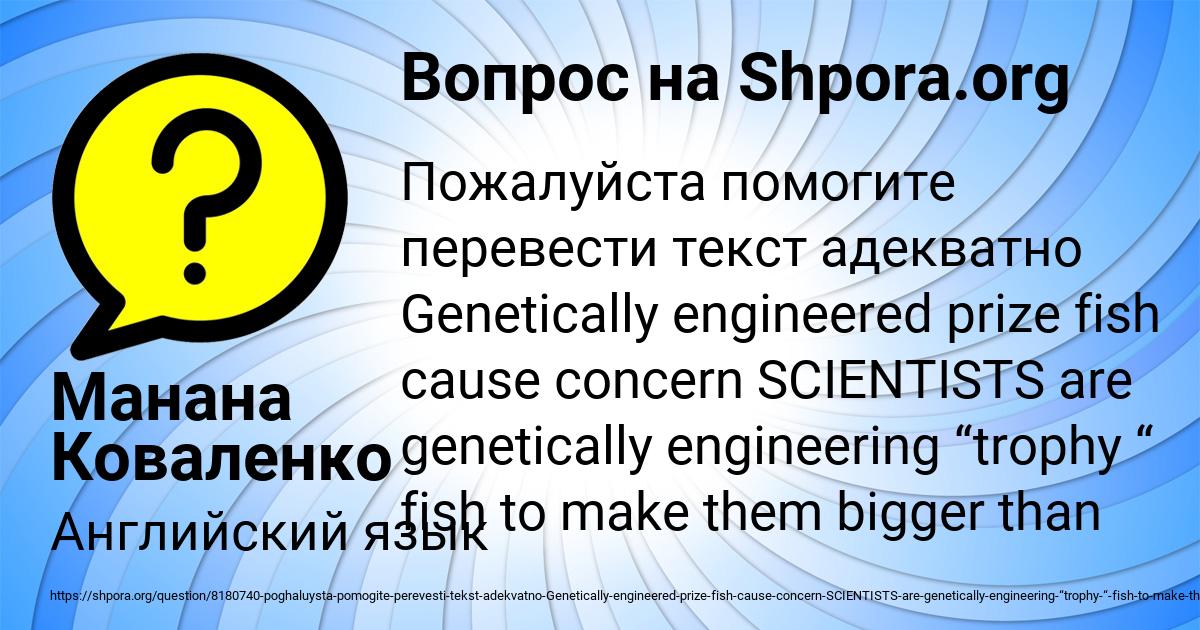Пожалуйста помогите перевести текст адекватно Genetically engineered prize fish cause concern SCIENTISTS are genetically engineering “trophy “ fish to make them bigger than ever for competition anglers. But the experiments have become caught in a wrangle over the ethics of such manipulation. Angling authorities are concerned over the ultimate size of artificially produced catches and environmentalists fear the effect on natural ecosystems of the ones that get away. Scientists say the most serious risk is that genetically engineered fish might be more competitive than natural fish, upsetting balances between predator and prey population. So far, results of only a couple of field trials have been published. Research has concentrated on adding genes to enhance growth by lifting controls on growth hormones. Similar work on pigs and cows produced unexpected side effects, including rheumatism. Genetic manipulation in fish is even less predictable, since little is known about their molecular make-up, according to Dr. David Penman, a research fellow at Stirling University’s Institutes of Aquaculture. “All this work is very much at the basic research, or speculation stage, “he said, “but the technology is there, or almost there” Exploration by the fishing industry includes the possibility of giving Atlantic salmon “anti-freeze” genes from cold-tolerant fish to extend their range into colder waters. Other scientist are working on fish with delayed breeding seasons that allow them to get fatter earlier. Dr. Penman has been commissioned by the Department of the Environment to produce a report on transgenic fish, due for publication next spring. He said the main brake on commercial interest was consumer acceptability and ethical concerns. “People are not so worried about eating engineered plants, but when it comes to animals that is a bit different.”
ever for competition anglers. But the experiments have become caught in a wrangle over the ethics of such manipulation. Angling authorities are concerned over the ultimate size of artificially produced catches and environmentalists fear the effect on natural ecosystems of the ones that get away. Scientists say the most serious risk is that genetically engineered fish might be more competitive than natural fish, upsetting balances between predator and prey population. So far, results of only a couple of field trials have been published. Research has concentrated on adding genes to enhance growth by lifting controls on growth hormones. Similar work on pigs and cows produced unexpected side effects, including rheumatism. Genetic manipulation in fish is even less predictable, since little is known about their molecular make-up, according to Dr. David Penman, a research fellow at Stirling University’s Institutes of Aquaculture. “All this work is very much at the basic research, or speculation stage, “he said, “but the technology is there, or almost there” Exploration by the fishing industry includes the possibility of giving Atlantic salmon “anti-freeze” genes from cold-tolerant fish to extend their range into colder waters. Other scientist are working on fish with delayed breeding seasons that allow them to get fatter earlier. Dr. Penman has been commissioned by the Department of the Environment to produce a report on transgenic fish, due for publication next spring. He said the main brake on commercial interest was consumer acceptability and ethical concerns. “People are not so worried about eating engineered plants, but when it comes to animals that is a bit different.”
Генномодифицированая рыба как повод для беспокойства. Ученые генетически модифицируют "трофейную" рыбу, чтобы сделать её максимально крупной для соревнований рыболовов. Но эти эксперименты вызывают споры об этичности таких действий. Рыболовные сообщества обеспокоены огромными размерами искусственно выведенных уловов, а защитники окружающей среды опасаются их отрицательного влияния на естественную экосистему. Ученые утверждают, что наибольшая опасность в том, что генномодифицированная рыба может быть более конкурентноспособной, чем обычная, выведенная в естественных условиях, что приведёт к нарушению баланса между хищниками и добычей. Пока были опубликованы лишь результаты нескольких полевых испытаний. Исследование сосредоточено на добавлении генов роста и контроле гормонов роста. Такие же эксперименты проводятся на свиньях и коровах и приводят к неожиданным побочным эффектам, включая ревматизм. Генетические манипуляции с рыбой менее продуктивны, так как их молекулярная структура менее изучена. Так утверждает Доктор Девид Пинман, научный сотрудник Института водной культуры при университете Стирлинга. "Вся эта работа очень важна на первых этапах исследований или на теоретическом этапе", - говорит он, - "но у нас есть технология, или почти есть." Исследования в рыбной промышленности включают возможность добавить Атлантическому лососю генов "антизаморозки" от морозоустойчивой рыбы, что позволит расширить их среду обитания в районах с холодной водой. Другие ученые работают над рыбой с замедленным сезоном размножения, что позволит раньше получать зрелую рыбу. Доктор Пинман был уполномочен Департаментом окружающей среды провести доклад о трансгенной рыбе, готовящийся к публикации следующей весной. Он утверждает, что основное препятствие в коммерческом плане - это неприятие со стороны потребителей и этические убеждения. "Люди не так боятся употреблять модифицированные растения, но когда дело доходит до животных, все немного меняется".
Также наши пользователи интересуются:
Помогите срочно!!!!Бактерии очень быстро размножаются некоторые виды делятся каждые 20 минут. Сколько таких бактерий окажется в помещении через 3 часа если первоначально туда В чем смысл жизни ?
⭐⭐⭐⭐⭐ Лучший ответ на вопрос «Пожалуйста помогите перевести текст адекватно Genetically engineered prize fish cause concern SCIENTISTS are genetically engineering “trophy “ fish to make them bigger than » от пользователя Манана Коваленко в разделе Английский язык. Задавайте вопросы и делитесь своими знаниями.
Открой этот вопрос на телефоне - включи камеру и наведи на QR-код!
